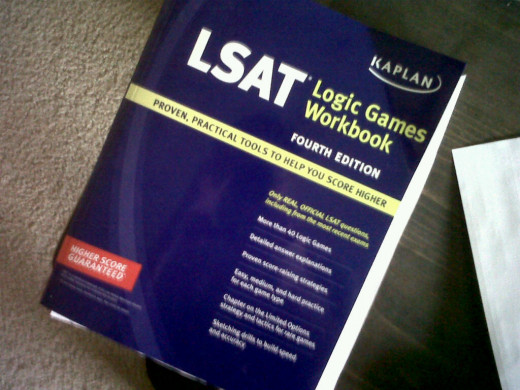How to Get a Higher LSAT Score

LSAT Success in a Few Simple Steps
You've watched "Law and Order" for years, stay glued to high-profile court cases in the news, and have an undergraduate degree in political science or philosophy--you're destined for law school. Preparation for applying to law school should start your first year at college, with a focus on great grades, campus involvement demonstrating leadership, and meaningful volunteer work. But there's one little box on the law school application that's just as important as all those other qualifications combined: your LSAT score.
The importance of your LSAT score on getting into law school cannot be overestimated--to get into a top school, it's vital. To get a great scholarship to a middle-of-the-road school, it's just as important. So how do you get a higher LSAT score? Read on for advice from a recent law graduate who scored in the 99th percentile on the LSAT and got a great scholarship (in other words, me).
Did you take the LSAT more than once to get a higher score?
Taking a Prep Course to Get a Higher LSAT Score
For many students, especially those applying to law school years after undergraduate or those coming from an undergraduate degree that's heavy in the maths and sciences rather than writing and analysis, the LSAT can be daunting. A three-hour test with dense passages on technical, boring subjects? Word problems that require a deep-dive into pure logic? It can sound like a nightmare.
A prep course is a good choice for these students--companies like Kaplan and Princeton offer intensive online and in-classroom programs, with around 30 hours of learning and even more of testing. These classes will give you an LSAT test on the first day or before the first class, to get an estimate of what you'd make going at the test cold and to see the areas where you need the most help. Then, the classes will go step-by-step through the different sections of the test and strategies for tackling it; most of the programs also guarantee an improvement in score or you get to re-take the class.
These courses may also be a good resource for students who didn't take a class the first time around and are looking for tips to get a higher LSAT score the second time around. The teachers in the class and the developers of the class material are experts in the LSAT and are paid to study the material and the tests, and some of them can share years of insight to boost your score.
Finally, the prep courses are the best route for those students who want to get a higher LSAT score but fear they won't have the self-discipline to study adequately on their own (and there's no shame in admitting that--many people work better in groups, and the LSAT is deadly dull; it takes a lot of willpower to stick to a study schedule all on your own).

Taking Practice Tests to Get a Higher LSAT Score
The absolute key to getting a higher LSAT score, whether you take a class or engage in self-study, is taking as many practice tests as you can in a timed environment. You can buy many of these tests on Amazon or on the official LSAT website; this can become pricey, but there's no substitute for the tests if you want a higher LSAT score. I studied exclusively with old tests and with the Powerscore Bibles (the best books, down) and raised my score from a 161 on my first test to a 172 on the second.
At first, take the tests without timing yourself; mark the questions you miss and return to them later to try again. As you get more comfortable and your speed increases, then start timing the tests. Supplement these old LSAT tests with focused study from the Powerscore Bibles in the areas where you need the most help.
The area most students fear are the logic games--drawing a myriad of (correct) conclusions from a deceptively simple word problem. These are difficult, but the secret to the LSAT is that this is truly the area where you can shine. There are only so many variations on a logic game, and if you do enough practice problems to recognize what TYPE of logic game it is, then you can memorize strategies for how to tackle it. This section can give you those extra few points that you need to get a higher LSAT score and be competitive at a top-tier school.

Balancing LSAT Study Habits with Real Life to Get a Higher LSAT Score
Part of LSAT success is not just becoming a logic games and reading comprehension master, but balancing your time. As I mentioned above, an LSAT class is a good choice for someone who isn't disciplined enough for self-study or needs a teacher's support; having to be present somewhere for a set period per week makes it easier to balance your other life activities around studying for the LSAT.
For self-studiers, balance is even more important--the LSAT is not something (for most of us) that you can study for a week before and then dominate the nation. It takes methodical study, discipline, and determination to master. If you're someone who tends to procrastinate but still chooses to self-study, structure your day as much as possible. Have a schedule for exercise, meals, and study. I also worked a part-time job while I studied for the LSAT, because knowing I had to pull an eight-hour shift at my job forced me to study during the two hours I had before my shift started.
And of course, all the cliched lectures your mother gave hold true for LSAT study as well: get sleep, eat well, exercise, and be sure to sprinkle in activities you enjoy so you don't get burned out.
Finally, remember that you can take the LSAT a second time, and most schools will take your highest score. With a good attitude and proper study habits, you can get a higher LSAT score.
After the LSAT: Deep Breaths and Life Decisions
It will feel like eons after the test, but eventually you will get your LSAT score. Regardless of whether the news leaves you jumping with joy or sobbing in a corner with disappointment, you have some decisions to make--mainly, should you really go to law school?
Law school is expensive and (for the first year, at least) highly stressful and competitive. Before you make the decision to go into debt and spend three years reading dry textbooks and obsessing over summer associate positions, sit down and plan out what an ideal career track might be. Do you have a set ambition to be a lawyer, or is it just something you decided to do for lack of other plans? Do you really know what being a lawyer entails--the daily ins and outs of the workplace? Do you have a realistic grasp on salary medians, employment statistics, and future growth in the job market?
These are all questions to think deeply on, and to discuss with your parents or significant other. If you're sure you still want to go to law school, then put the stamp on your law application, and good luck!








